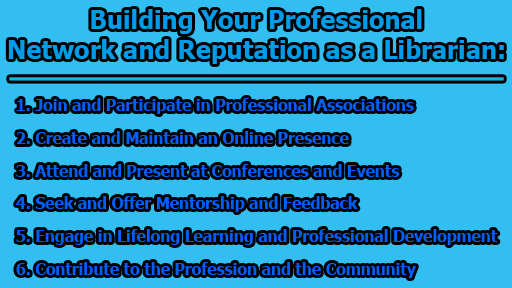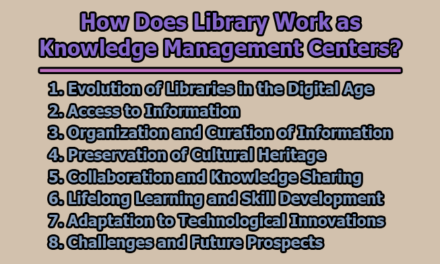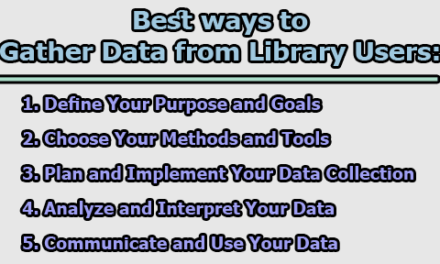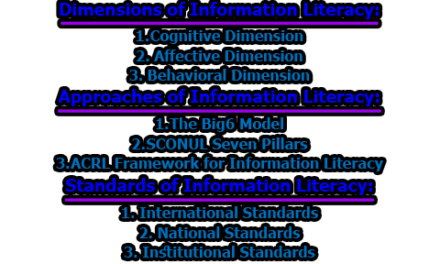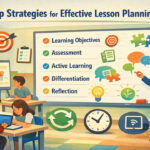Building Your Professional Network and Reputation as a Librarian:
As a librarian, staying connected with the latest trends, resources, and opportunities in the field is essential for professional growth. Building a strong professional network and a solid reputation is key to advancing your career. Whether you work in an academic, public, school, or special library, this article will explore building your professional network and reputation as a librarian.
1. Join and Participate in Professional Associations: One of the most effective ways to expand your network and establish your reputation as a librarian is by joining and actively participating in professional associations related to library services. These associations, such as the American Library Association (ALA), the Association of College and Research Libraries (ACRL), the Public Library Association (PLA), the American Association of School Librarians (AASL), and the Special Libraries Association (SLA), offer a wealth of resources and opportunities.
By becoming a member, you gain access to journals, newsletters, webinars, conferences, workshops, awards, scholarships, and mentoring programs. Volunteering for committees, task forces, or leadership positions within these associations allows you to develop your skills, contribute to the profession, and gain recognition.
2. Create and Maintain an Online Presence: In today’s digital age, it’s crucial for librarians to establish an online presence that showcases their expertise, interests, and accomplishments. Social media platforms like LinkedIn, Twitter, Facebook, and Instagram can be powerful tools for sharing insights, opinions, projects, publications, and events related to library services. Additionally, creating a blog, a podcast, a YouTube channel, or a portfolio website enables you to demonstrate your knowledge, skills, and creativity.
Participating in online communities, such as listservs, forums, or groups, allows you to exchange ideas, ask questions, offer advice, and collaborate with other librarians. Your online presence not only helps you connect with fellow professionals but also demonstrates your commitment to staying at the forefront of your field.
3. Attend and Present at Conferences and Events: Attending conferences and events related to library services is an excellent way to learn from experts, discover new trends, resources, and tools, and network with peers, mentors, employers, or potential collaborators. Additionally, presenting your own research, projects, or best practices can establish your authority, credibility, and visibility in the field.
Engaging in poster sessions, lightning talks, panels, or workshops allows you to showcase your communication, presentation, and teaching skills. Active participation in such events opens doors to opportunities for professional development and recognition.
4. Seek and Offer Mentorship and Feedback: Mentorship is a valuable aspect of professional growth. Seeking guidance, support, and advice from experienced professionals can significantly enhance your career. You can find a mentor through your professional associations, your workplace, your alumni network, or online communities.
Moreover, offering mentorship to newcomers or those facing challenges in the field can be equally rewarding. Mentoring not only helps others but also strengthens your knowledge and leadership abilities. Seeking and offering feedback on each other’s work, such as publications, projects, or presentations, is an excellent way to improve the quality, accuracy, and relevance of your contributions and build trust and collaboration within the community.
5. Engage in Lifelong Learning and Professional Development: Continual learning and professional development are essential for librarians to stay relevant in an ever-evolving field. You can achieve this by taking courses, webinars, workshops, or certificates online or in person, offered by your professional associations, your employer, or other organizations. Reading books, journals, blogs, podcasts, or newsletters related to library services also keeps you informed about the latest developments.
For those looking to advance their careers, pursuing further education, such as a master’s degree, a doctoral degree, or a postgraduate certificate in library and information science or a related field, is a significant step toward enhancing expertise and credibility.
6. Contribute to the Profession and the Community: Contributing to the profession and the community is a rewarding way to build your network and reputation as a librarian. Publishing your research, projects, or best practices in journals, magazines, books, or online platforms related to library services helps establish your authority in the field. Reviewing, editing, or peer-reviewing the work of other librarians enhances your critical thinking, writing, and evaluation skills.
Additionally, giving back to the community by volunteering, partnering, or advocating for library services in various settings promotes literacy, information literacy, digital literacy, and social justice. Participating in outreach, education, or awareness programs not only benefits the community but also highlights your commitment to the values and goals of the library profession.
In conclusion, building a professional network and reputation as a librarian requires dedication, active involvement, and a commitment to lifelong learning and development. Joining professional associations, creating an online presence, attending conferences, seeking mentorship and feedback, engaging in lifelong learning, and contributing to the profession and the community are all vital steps to help you advance in your career and make a meaningful impact in the field of library services. By following these strategies, you can grow as a professional, connect with like-minded individuals, and contribute to the continuous development of library services.

Library Lecturer at Nurul Amin Degree College

